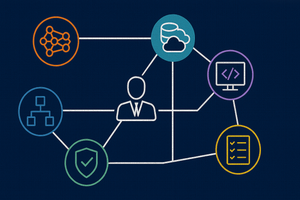Keynote Theme
Even though Ignite is a "Developer Conference", this year's Ignite Keynote could have been from an AI (only) conference! Not surprising, given AI is high on the list of hyperscaler investment--as well as top of mind for many--if not most--CIOs.
Judson Althoff introduced the concept of a Frontier Firm as an organization using AI responsibly and intelligently to deliver efficiency and competitive improvements. This set the tone for a keynote theme that emphasized how Microsoft is elevating AI platforms and all its main product platforms with governance and enterprise integration features.
Main Theme: Evolving AI into an Enterprise Asset
If past Ignite announcements were the introduction of new AI Tooling for enterprise customers, I think this year's announcements follow a theme of evolution of Microsoft AI tech to enable full process re-orchestration via Agetic AI–-in a secure and governed way.
- Copilot isn't new, but this year there were many announcements about how it's getting smarter and integrating with other parts of the enterprise knowledge graph and pivoting from an information broker to an action taker via Work IQ.
- Copilot Studio (and no-code AI App building in general) isn't new, but App Builder raises the level of abstraction even further in an attempt to enable citizen developers by requiring even less technical knowledge to create useful AI-backed spot solutions.
- Fabric Copilot isn't new, but Fabric IQ promises to pull in organizational knowledge to provide a "Unified Intelligence" solution that ties Fabric data to organizational data to provide better context and relevance.
- AI Foundry isn't new, but Foundry IQ adds grounding data from every other organizational data source [potentially]. Governance and IT administration layers via the Foundry Control Plane enhance organizational visibility and control surfaces that the original Foundry didn't have in its initial release.
- Purview and security layers aren't new either, but now they're empowered to govern and reduce/monitor attack vectors aimed at AI agents.
In past years, the message was to educate on what AI is and how important it is to adopt it. The message now seems to be how to adopt AI past the PoC stage (i.e. agents), and how to manage it when deployed (i.e. governance).
Azure Gets Last Billing
Azure and its capabilities came late in the keynote, after the AI announcements and demos were finished. I remember when Azure went first in developer conferences....probably at some next conference core Azure will again take top billing...
- Scott Guthrie gave a "state of the union" around Azure's endless march to be a leader in scale, geographical breadth, GPU deployments, sustainable energy use. He highlighted a new data center near Atlanta the "size of 20 football fields".
- Horizon DB was announced – bringing PostgreSQL into Azure with high scalability and availability. For those who weren't ready to embrace Postgres without a fully managed, scalable product – take another look!
More Details - most interesting sections
The following sections I found most interesting and worth remembering. I'll list them, then discuss the importance of each.
Defining the Frontier Firm
Judson Althoff led off the day introducing the concept of the Frontier Firm, which is the type of firm he hopes customers will aspire to become as they integrate AI Agents and tools into their business.
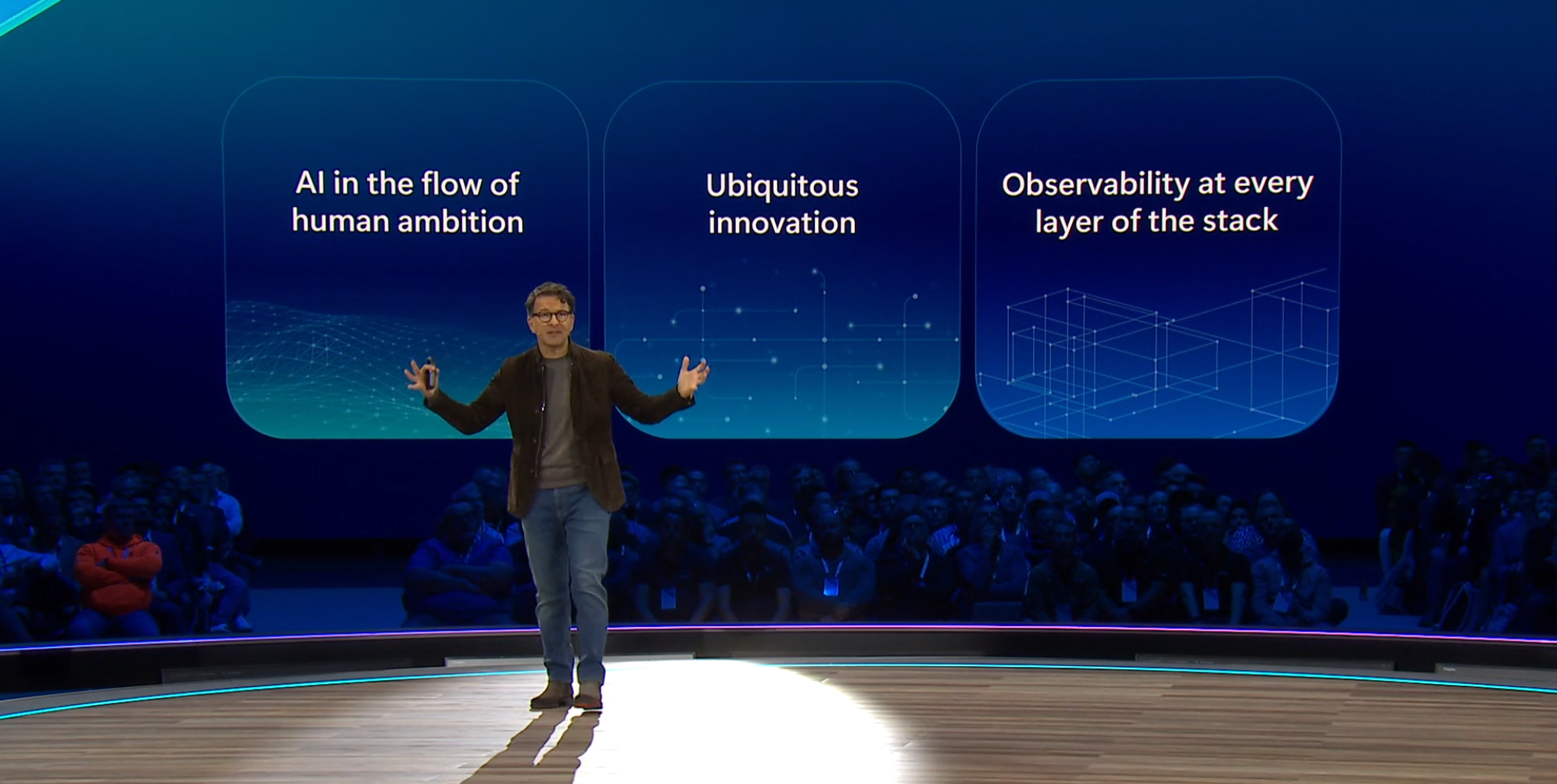
In his model, a Frontier firm has the following attributes:
- AI in the flow of human ambition. AI that helps people pursue their larger ambitions.
- Ubiquitous Innovation. AI isn't restricted to narrow groups, but is available for use by everyone.
- Observability at every layer of the stack. AI use is transparent, measurable and traceable. Based on what followed, "governance" is the watch word in an enterprise setting.
Copilot Enterprise Penetration
When Copilot was introduced it was available to a select few (very large) organizations. Remember? There were a lot of doubts that organizations would spend on per-seat Copilot licenses.
I guess Microsoft had a good plan, as they now claim 90% of the Fortune 500 have deployed Copilot. I didn't hear whether this was "at least 1 seat" or "to everyone", but it's an impressive stat either way.
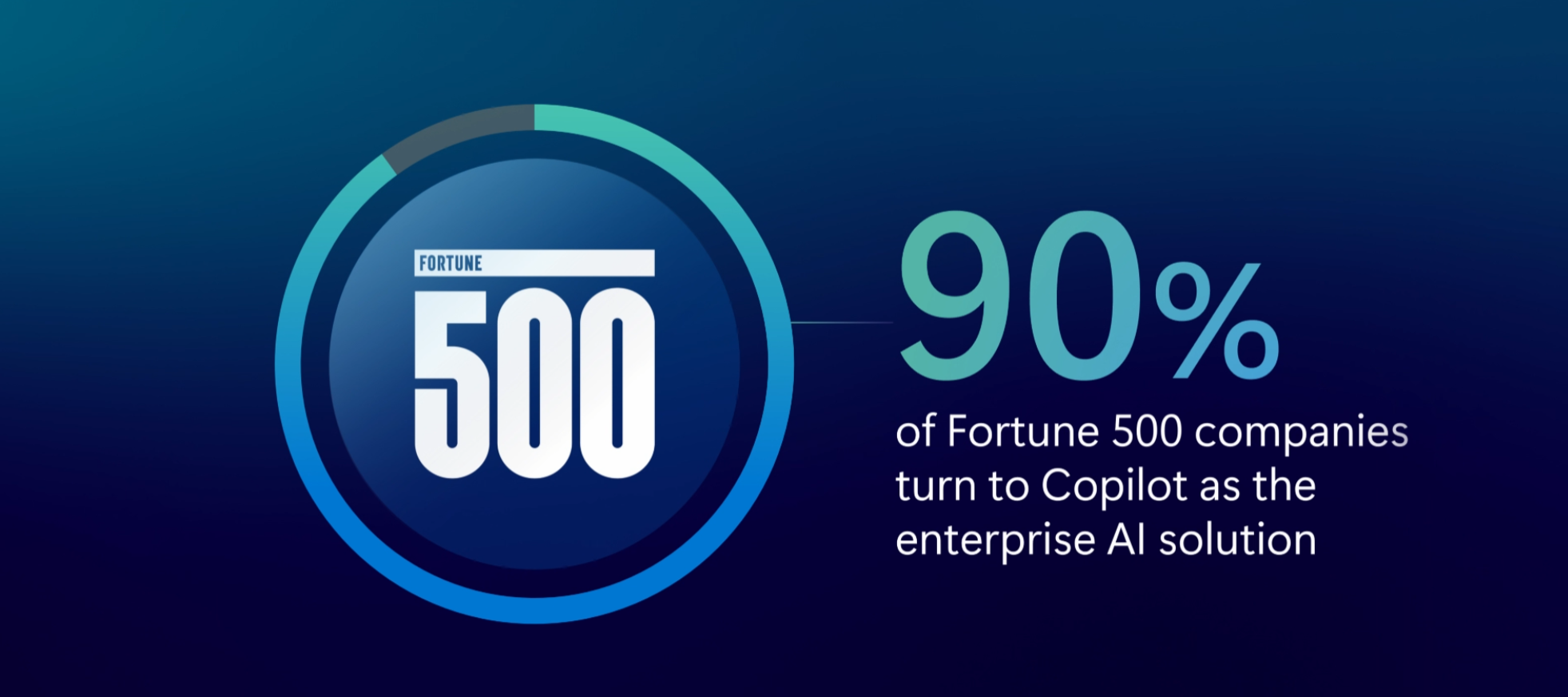
Work IQ
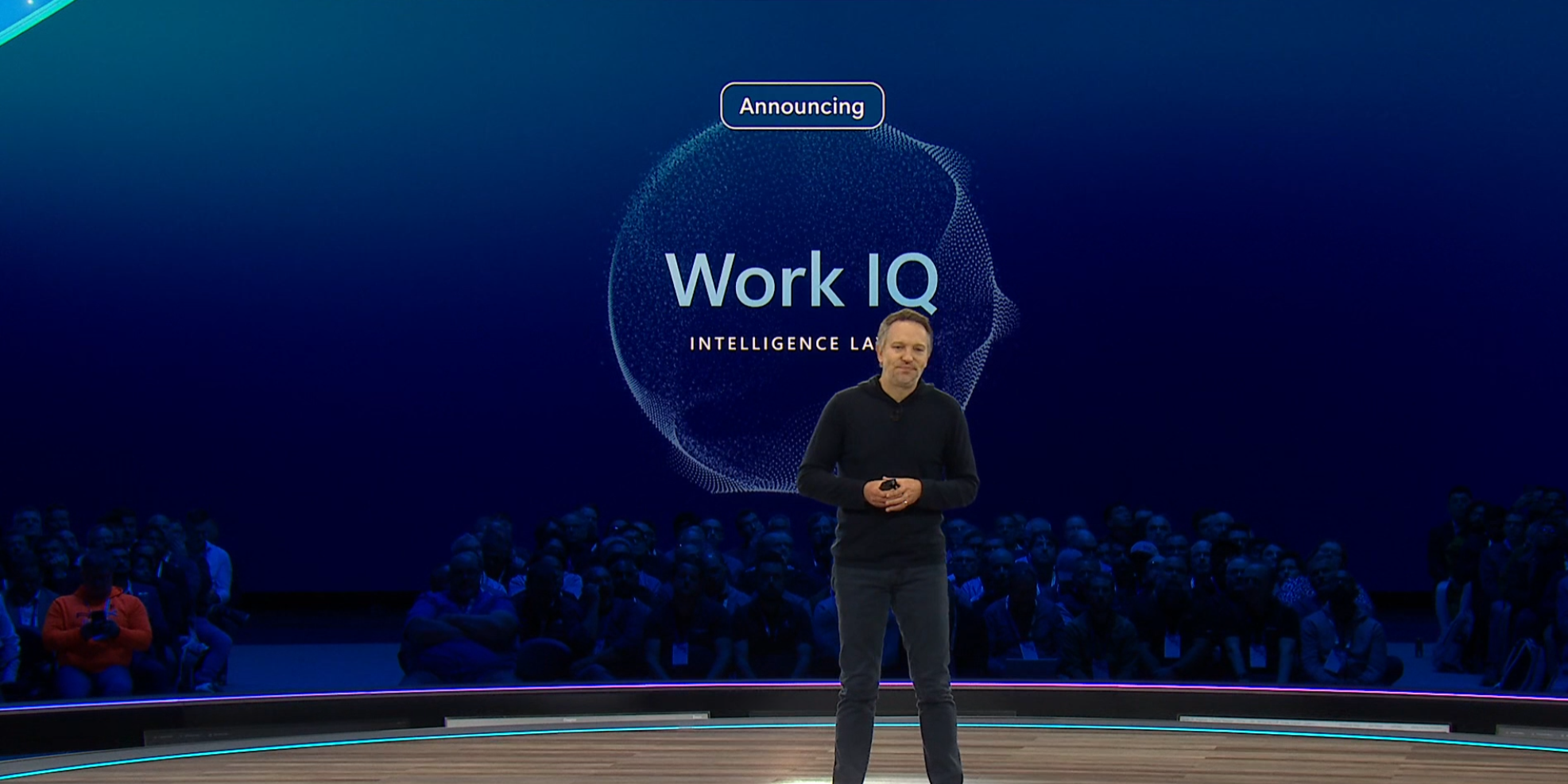
During the event, Microsoft announced productized offerings under a "____ IQ" branding: Work IQ, Fabric IQ and Foundry IQ.
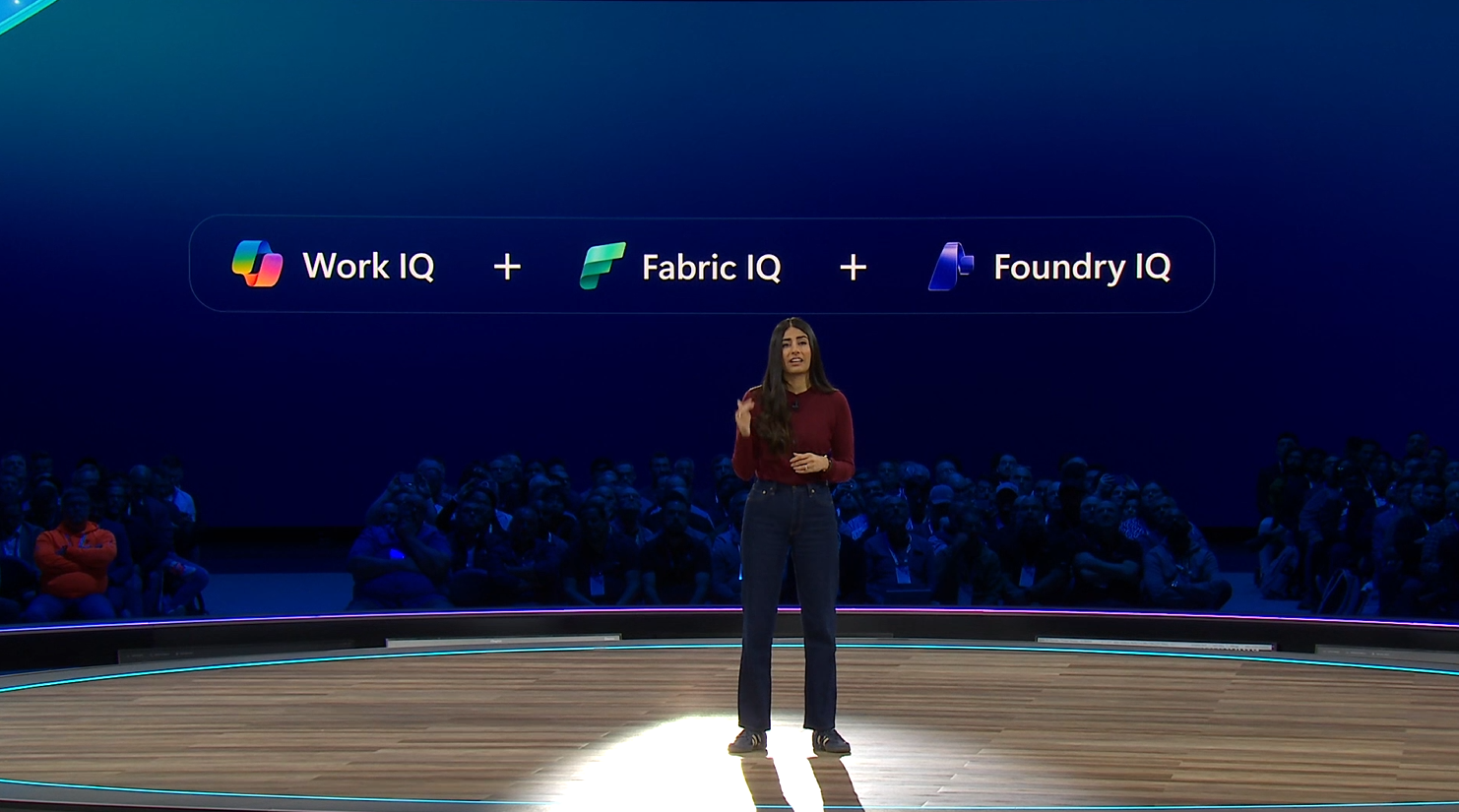
Each of these initiatives are intended to use AI to bring an intelligence layer to core products (the word that comes before "IQ").
For Work IQ, the value prop:
- What if Copilot had access to all your documents, a knowledge graph of the place where you work, your calendar.
- What if it could automate multi-step workflows, outline a presentation based on its knowledge of the subject of the presentation – then transfer that over to an Office doc as a draft?
You get the idea. A knowledge graph and agents behind Copilot letting it not just tell you what's out there, but taking the next step for you.
Epic Customer Testimonial
Epic came on stage to talk through how they've woven AI agents into the various layers of their healthcare platform and how AI has made physicians and hospitals more effective and efficient.
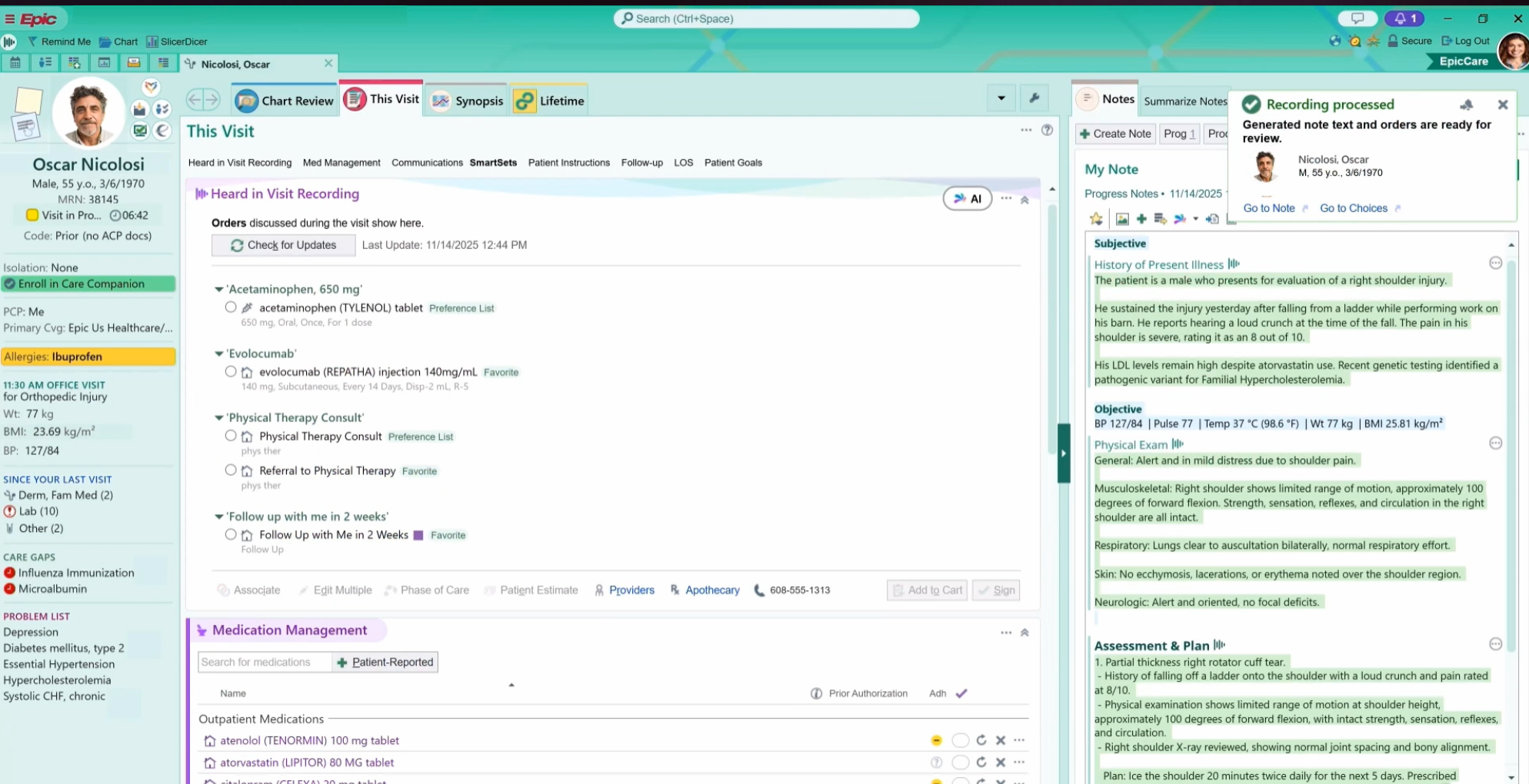
Some AI ROI Claims:
- Embedded in all applications at this point
- Allows docs to respond to patient inquiries faster
- Reduces referral processing time by 30-40%
- Docs finding key information that would have been missed in manual review
- Incrases ability for physicians to care for more patients
App Builder
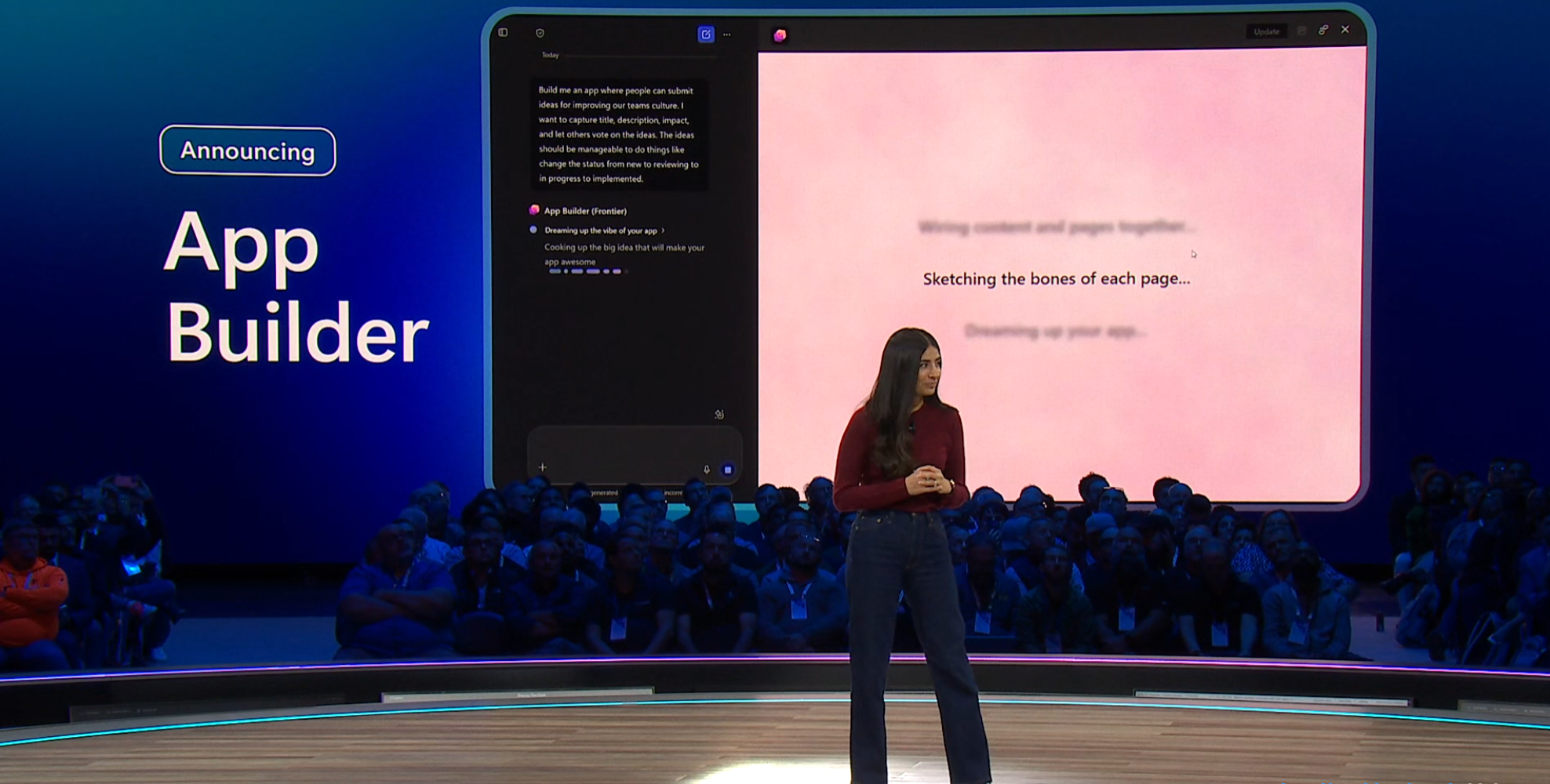
Announced was App Builder. This looks like an effort to raise the level of abstraction for creating end-user point solutions even higher (higher abstraction meaning: end users are more able than ever to design and deploy their own apps).
Remember Power Virtual Agents? PVA was a chat agent builder that was, well, a bit complicated to use, but still easier than hand-coding agents in the Azure Bot Service.
Copilot Studio made PVA easier. Then came the ability to describe an app that Copilot Studio could frame out using a language model (an awesome improvement!).
App Builder looks like the evolution of this lineage, bring the level of abstraction up even further, and making point solutions even more possible for end users.
Github Copilot Staying in the Fight
Enhancements to Github Copilot are particularly notable. This product has been evolving quickly to try to keep pace with leading products like Claude and Cursor.
- The most interesting to me were the addition of autonomous agents (running outside of the developer context), including a demo of an agent raising Github PRs on their own time for later human review.
- This isn't a first...Claude Code has a similar PR raising feature--but not many others do so this is significant to see.
- Cursor has a compelling PR review agent and can create Github issues but doesn't necessarily fix code independently (though by the time you read this it probably does 😄) .
- Code completion and agent mode in these tools is getting mature – autonomous agents are the next level up.
- All of this feels like self-driving features for cars applied to coding – and hey, sign me up!
Agent 365
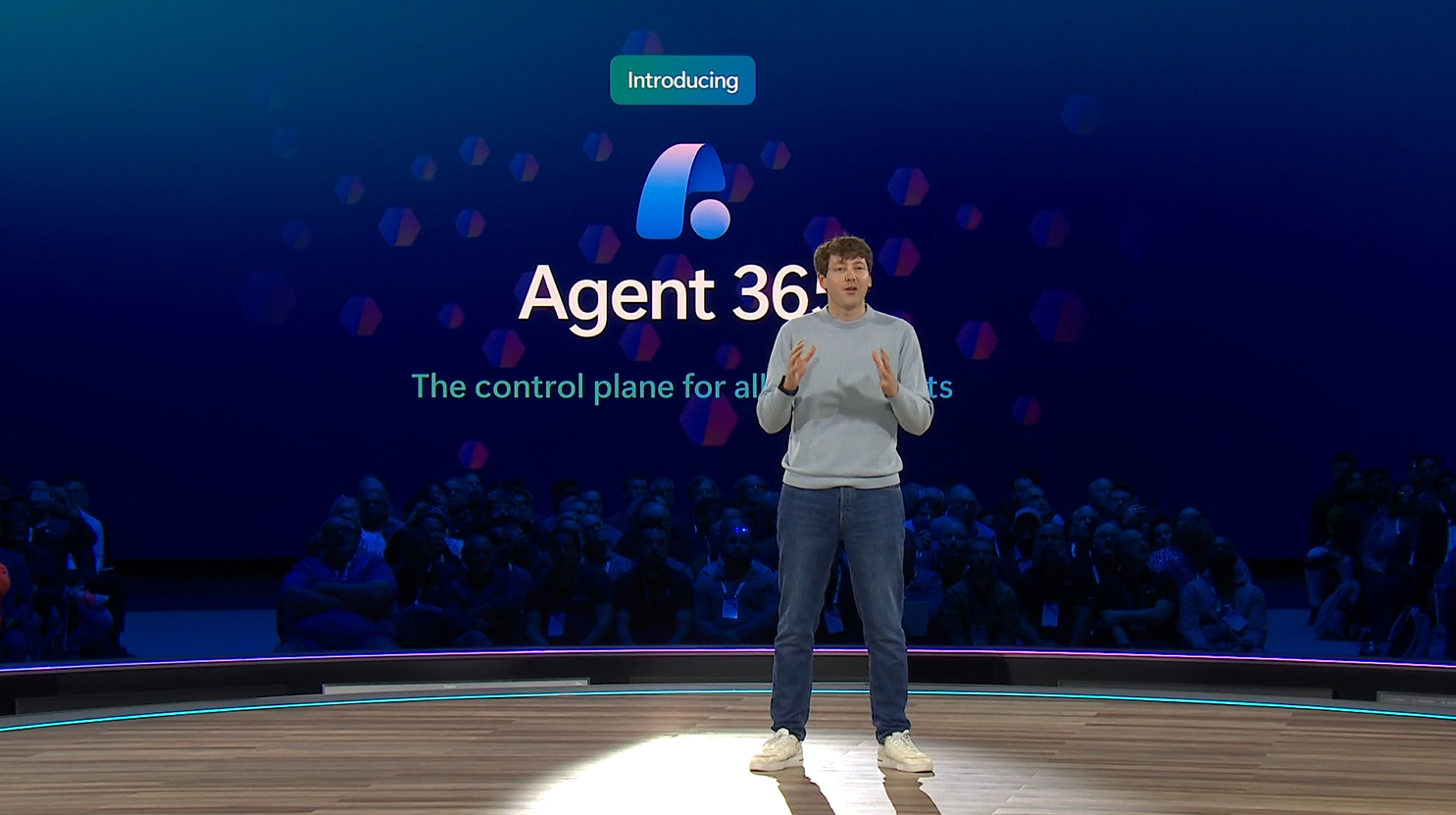
Now we get back to the Frontier Firm, the one that is sophisticated and progressive in its use of AI--yet disciplined and responsible in how AI is used.
Agent 365 is The control plane for all agents. This is actually a big deal. Maybe the biggest deal from a governance point of view.
The value-prop for this service is to provide an umbrella of visibility to IT Ops and Cyber/Security folks over all the agents used in an organization.
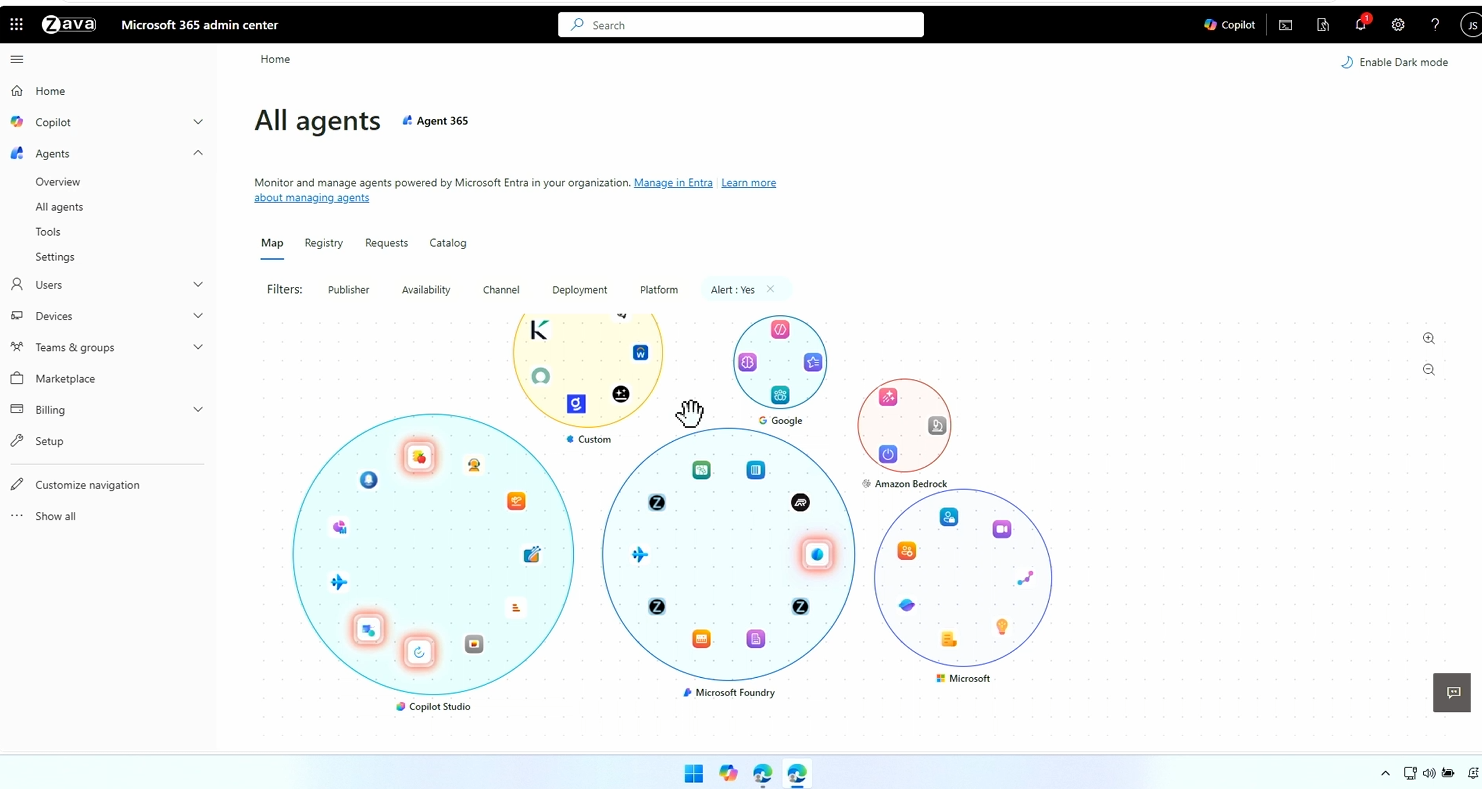
The approach does ring familiar:
- In M365 admins can control who can install what software or browser extensions. Users who want new tools have to ask for review/approval.
- Mobile Device Management systems keep gates in front of mobile apps, and provide some degree of control over your phone (including wiping them if needed).
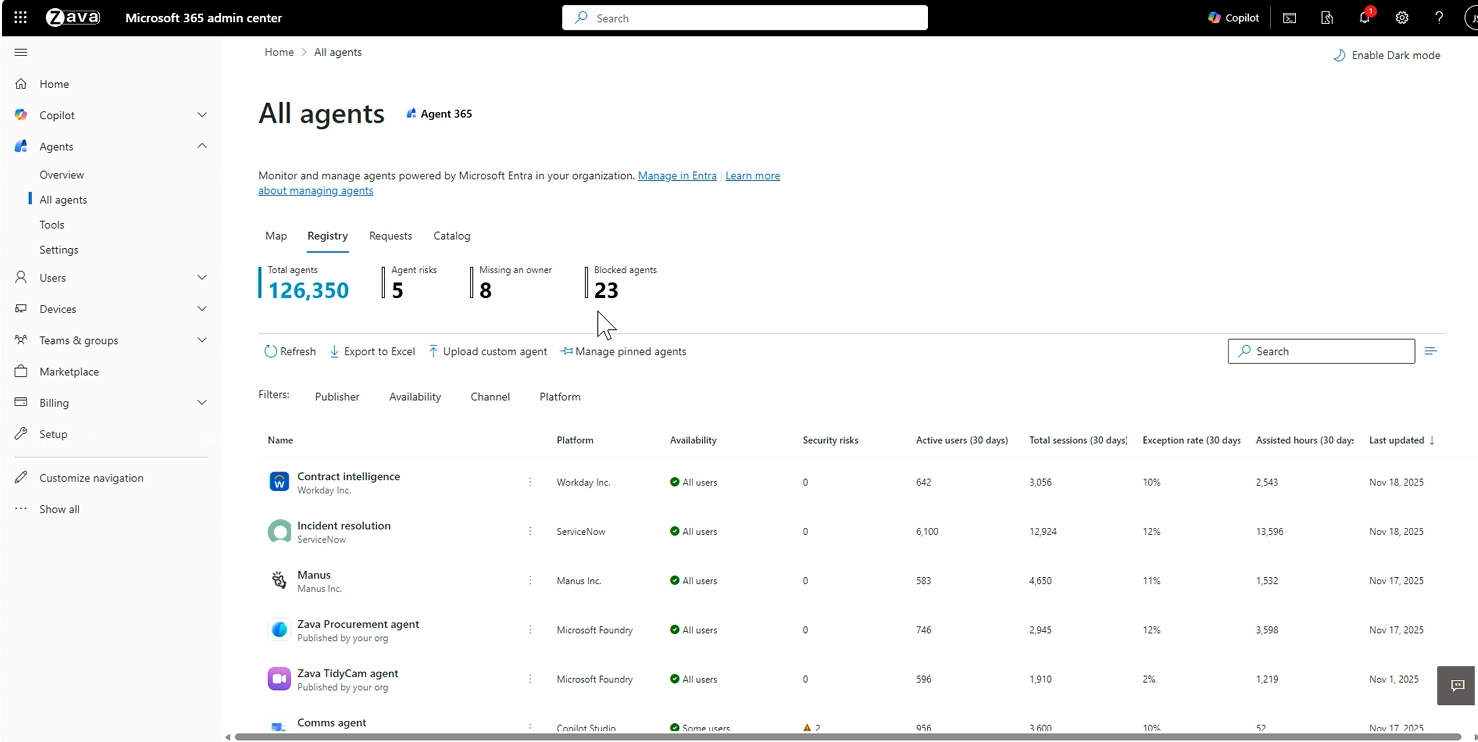
Agent 365 is similar – agents are software (basically), and it provides a visibility/threat monitoring/governance layer.
Yep, the wild-west of unsupervised agent deployment is over before it really got started 😄
Foundry Control Plane
If Agent 365 is the centralized system admin's dashboard for what's going on with Agent usage and security monitoring, Foundry Control Plane is the developer view of how those agents are performing, how much they cost, and whether they're drifting or still producing accurate results.
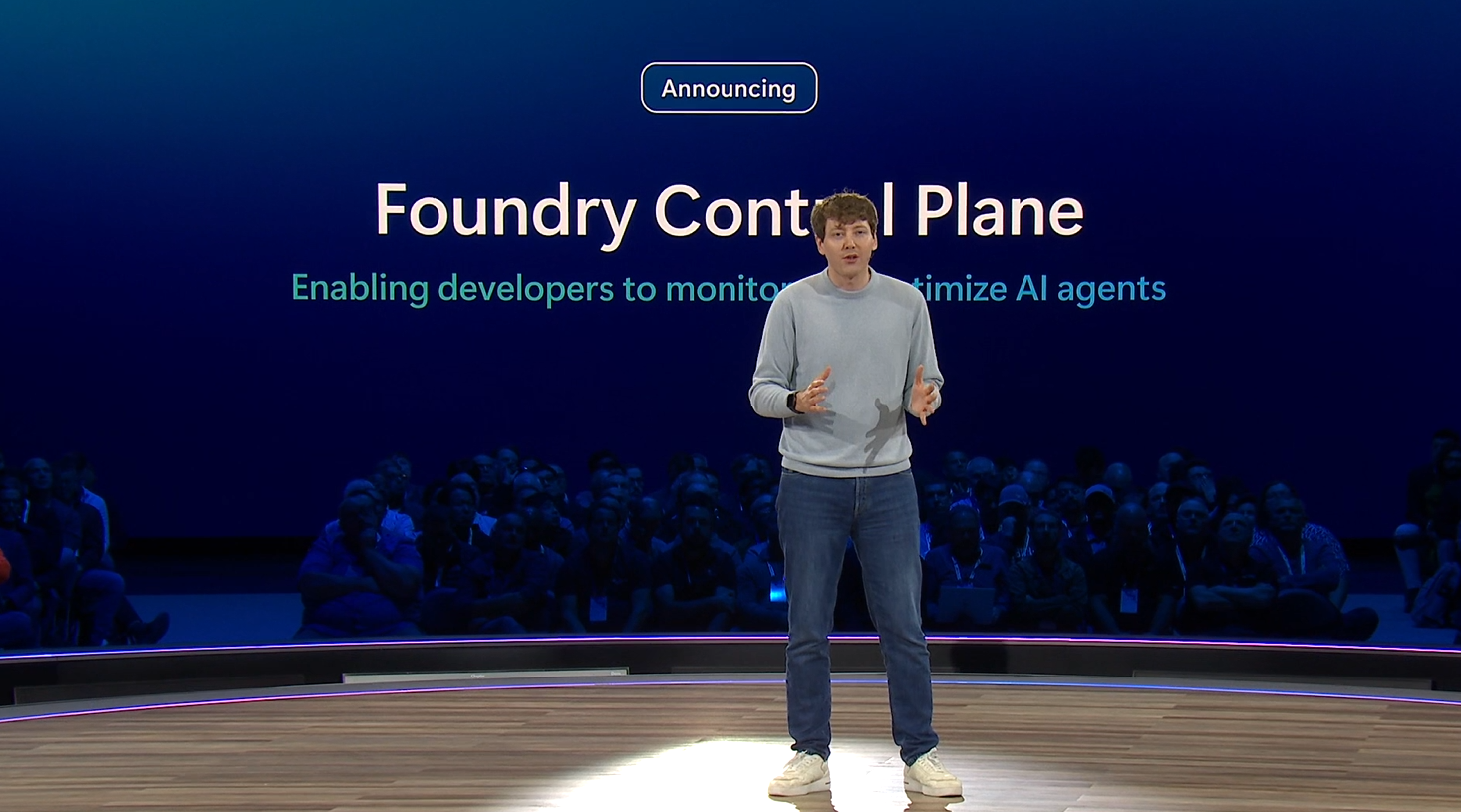
Control Plane feels like an evolution of tactical governance tools already present in AI Foundry – but taken to a higher level and made more opinionated (in a good way) than before.
Most developers will be pretty happy to have pre-scripted governance so they an focus on the creative elements of the job.
Azure State of the State
Winding up the keynote was a talk by Scott Guthrie to give an update on Azure.
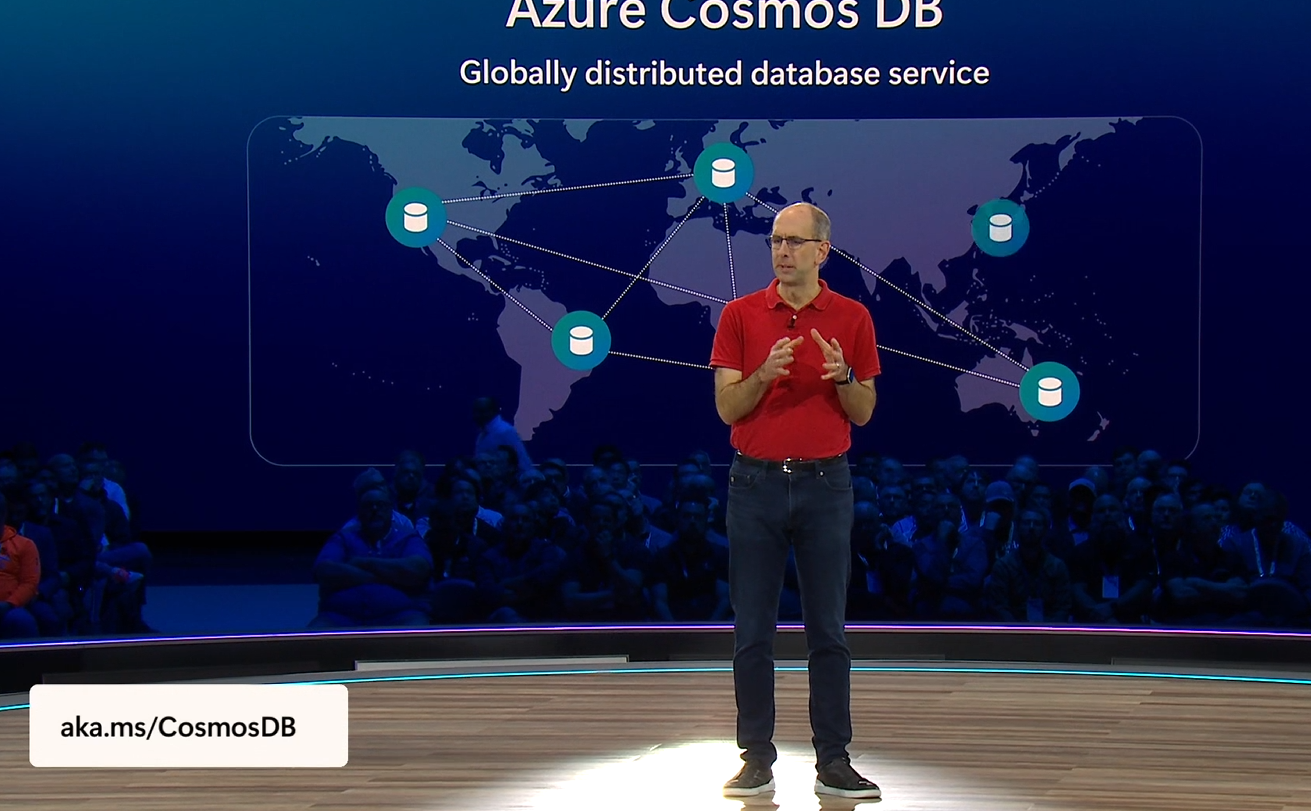
Most of the talk was reinforcing Azure value, and making sure to reinforce the message that the ever evolving Azure platform provides a grounding layer for all the exiting AI announcements that came before.
It definitely shouldn't go without saying that none of the high performance computing needed for the AI products would work without a solid Azure foundation. The Azure team rocks.



